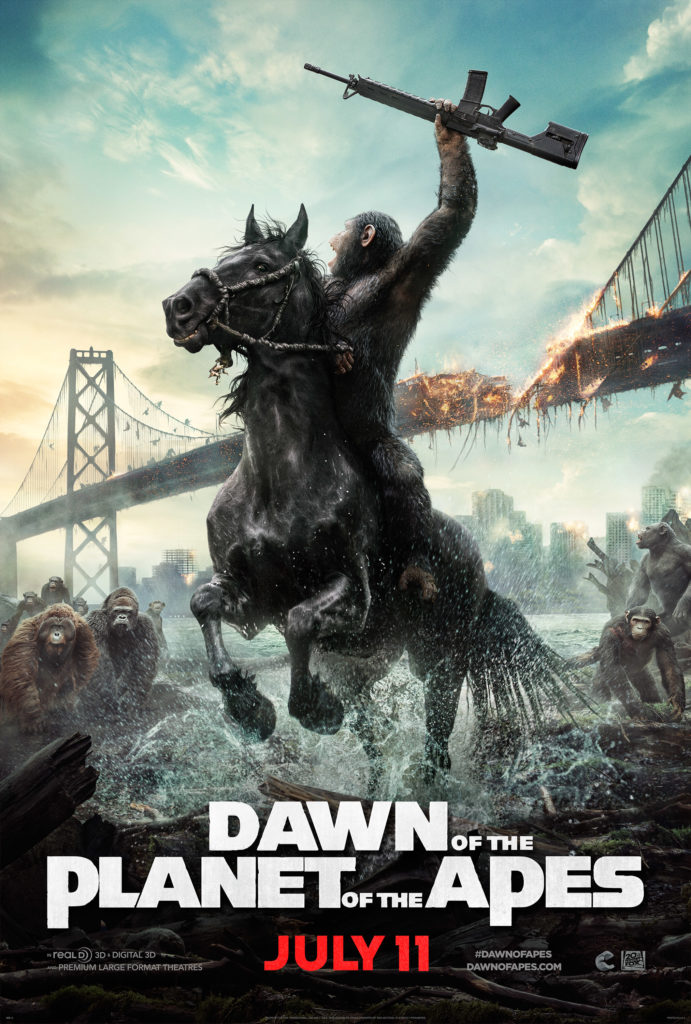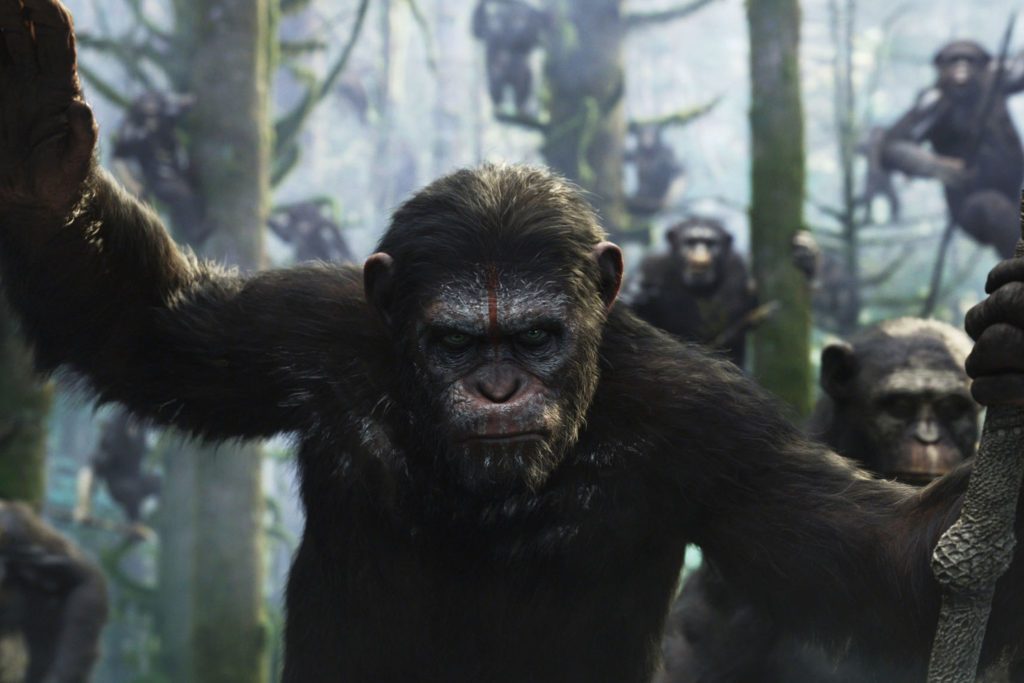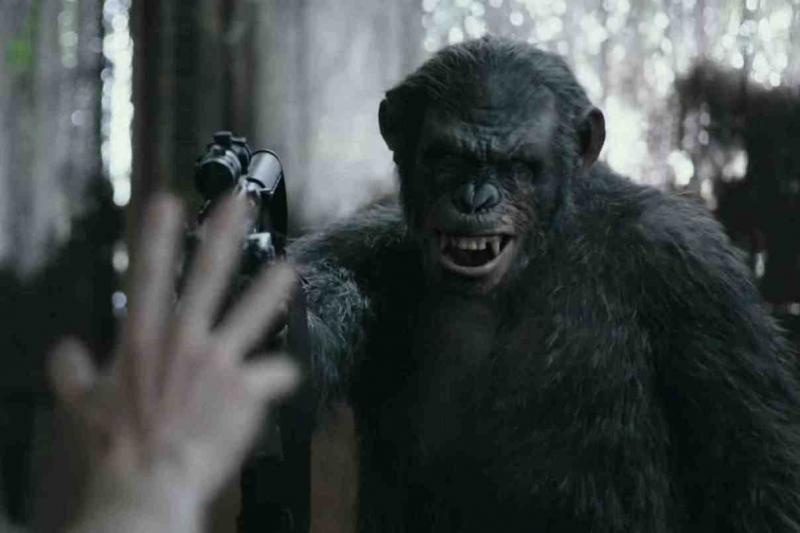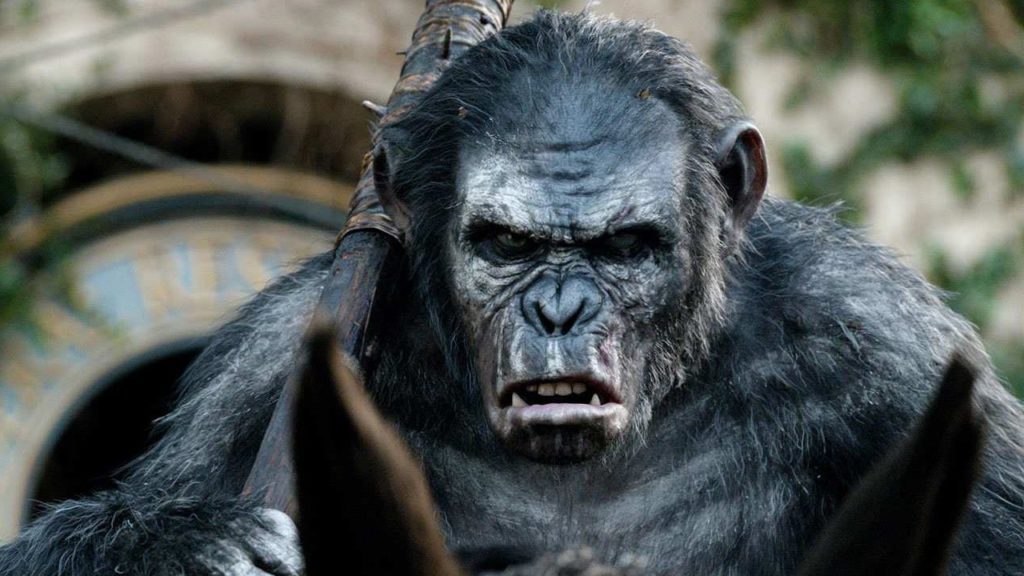Welcome back to the Planet of the Apes retrospective! In today’s post we’re going to be looking at 2014’s Dawn of the Planet of the Apes, the second entry in the reboot trilogy! Rise provided a fantastic set-up for the Apes franchise to move forward into the future. Would Dawn make good on that promise and deliver a sequel worthy of the series’ venerable legacy? Read on to find out…

Production
One of the many things that Rise did well was provide fertile narrative ground from which sequels could flourish. Director Rupert Wyatt stated his excitement over the directions potential sequels could take, specifically that the relationship between Caesar and Koba would be a natural focus. He stated his desire to have the next film take place around eight years after Rise, giving time for another generation of apes to have been born and raised. Further sequels would then continue the narrative until they could circle back to the original Planet of the Apes. Andy Serkis was secured very early on into production, while Rick Jaffa and Amanda Silver returned to work on the screenplay and Wyatt was once again set to direct.
However, by September of 2012 Rupert Wyatt was having doubts about directing the film, feeling that the studio-mandated May 2014 release date wouldn’t give him enough time to create a movie he was happy with. Whatever the case, two weeks later it was announced that Matt Reeves would be taking over the director’s chair. I remember when this was announced being sad that Wyatt was leaving, but being very excited because Reeves had already proven himself as an exciting and competent director with Cloverfield, so I was certain he would be able to deliver a great movie. Reeves brought with him Mark Bomback (one of the writers of Live Free or Die Hard), who did a re-write of Jaffa and Silver’s script.
With Wyatt’s departure, James Franco and Freida Pinto’s characters were written out of the sequel, implied to have died during the apocalyptic simian flu outbreak at the end of Rise. In their place, the main human characters were filled out by Jason Clarke, Keri Russell and Kodi Smit-McPhee. Gary Oldman was also secured as the leader of the human encampment in a semi-antagonistic role. As for the apes, Terry Notary and Karin Konoval reprised their roles as Rocket and Maurice, respectively. Meanwhile, Koba was recast with Tony Kebbell taking over for Christopher Gordon, and Judy Greer took over for Devyn Dalton as Caesar’s mate, Cornelia. Finally, Nick Thurston was cast as Blue Eyes, Caesar and Cornelia’s son.
Filming began in April 2013 in British Columbia, using locations such as Campbell River and Vancouver Island to simulate the San Francisco redwoods. The next month, production moved to New Orleans for various urban environments used in the film. Like Rise, Dawn depended on computer-generated effects to bring its apes to life. In addition, several other animals in the film were created digitally, including elk, a bear and several horses. Also worth noting is that the film’s soundtrack was composed by Michael Giacchino (composer of several amazing scores, including The Incredibles, Up, Rogue One and Jurassic World) and features several terrible and awesome ape puns in the track titles. In spite of Wyatt’s worries about the film’s scheduling, Dawn‘s release date was changed a few times, eventually settling on July 11, 2014. The film was a huge success, grossing $208.5 million domestically and over $708 million worldwide, making it by far the most successful Apes movie ever.

Plot Synopsis
Ten years have passed since the events of Rise of the Planet of the Apes. The ALZ-113 virus, dubbed the “Simian Flu” has wiped out 99.8% of the global human population. In the meantime, Caesar has established a commune where hundreds of apes live together in harmony. This peace is shattered when one of the apes, Ash, is shot by a human named Carver. Caesar finds Carver’s expedition, led by a man named Malcolm, and orders them to leave. The apes then follow the humans back to their colony in the ruins of San Francisco and warn them not to enter ape territory again or face retribution. However, Malcolm soon returns to ape territory with his expedition team to explain what they want. It turns out that there is a hydroelectric dam within the apes’ territory which Malcolm needs to restart, because the human colony is running dangerously low on fuel. Caesar agrees to let them work, on the condition that the humans’ guns be taken away, reasoning that they are desperate enough that they will fight the apes for access to the dam. Koba, one of Caesar’s trusted lieutenants, is infuriated at this concession and seeks to find evidence of human treachery so that Caesar will go to war. Caesar’s son, Blue Eyes, does not trust the humans either and openly disapproves of his father’s concessions.
The humans and apes begin to grow an uneasy respect for one another, sharing knowledge and helping one another. However, this respect is nearly shattered when it is revealed that Carver has smuggled a gun along with him and threatens Caesar’s sons with it. Malcolm barely manages to be allowed to continue working, having to throw Carver out of the group and have his wife treat Caesar’s wife’s illness in order to stay. However, Koba discovers that the humans in San Francisco have a stockpile of weapons and are preparing for war if Malcolm fails to get the power running soon. When he discovers that Caesar has allowed the humans to stay after they threatened his sons, Koba confronts Caesar and the pair fight. Caesar overcomes his lieutenant, but shows him mercy despite knowing that he has lost Koba’s trust.
Planning treachery, Koba sneaks back into the weapons stockpile, steals a gun, kills two guards and then kills Carver. While he’s doing this, the humans finally repair the dam and get the power running. They celebrate the accomplishment with Caesar and the other apes, but the moment is broken when Koba shoots Caesar and his body tumbles off a ledge into the river. Koba starts a fire and frames Carver for the shooting, rallying the apes to attack the human colony. Malcolm and his family flee and hide from the apes as Koba’s army attack the weapons stockpile. The humans are warned of the attack and a battle ensues, with several apes and humans being killed. However, the apes breach the gates and begin rounding up every human they can find. Blue Eyes and Ash object to Koba’s brutal treatment of the humans, but Koba kills Ash and says that he leads the apes now.
Meanwhile, Malcolm and his family find Caesar alive and head into the city to find shelter. Caesar leads them back to his old home and they take shelter here while Malcolm heads back to the colony to get medicine. He encounters a disillusioned Blue Eyes, who he tells that Caesar is still alive. Realizing that Koba is to blame for the shooting, Blue Eyes begins to lead a rebellion against the apes’ new leader, freeing the humans and apes still loyal to Caesar. Despite his wounds, Caesar goes to confront Koba at the half-built tower where the human colony is. Meanwhile, Malcolm encounters a group of human survivors beneath the tower who reveal that they have established radio contact with soldiers to the north who are on their way to help. They also reveal that they have set C4 around the base of the tower. Malcolm holds them at gunpoint, telling them that Caesar is battling Koba and that he can bring peace again. The survivors don’t listen and instead set off the C4, killing themselves and causing the tower to begin to hobble. Caesar and Koba do battle again, but when the tower begins to collapse Caesar focuses on rescuing wounded apes while Koba pushes them aside to get to Caesar. However, Caesar tackles his former lieutenant and Koba nearly falls off a ledge. He asks Caesar for mercy, but Caesar pushes him off the tower, sending him falling to his death. In the aftermath, Caesar regains control of the apes, but Malcolm warns him that soldiers are on their way to retaliate against them. The pair mourn that their bid for peace has failed and Malcolm escapes with his family while Caesar regretfully prepares his people for war.

Review
Rise was a great way to reboot the Apes franchise, but Dawn takes the ideas from that film and pushes them to a whole new level. It’s been a few years since I last saw this movie and revisiting it in 2020 was a refreshing experience. First of all, seeing the collapse of humanity to the Simian Flu hit extra hard in the middle of the second wave of COVID-19 and made it easier to empathize with the humans. Obviously there was no way they could have known this while making the movie (there are references to H1N1 and bird flu, the closest analogues we had experienced up to that point), but it makes for a far more interesting and relevant reason for society to collapse compared to the implication that nuclear war did it in the original films. Given the rise of populist fascist movements in the past four years, it was also extra-tragic seeing the apes go from a peaceful commune trying to make a better future for humans and apes, to falling under the sway of a vengeful dictator who spoils any chance for peace. The Apes franchise is inherently tragic so this is to be expected, but it makes for an affecting narrative seeing how things could have gone in a far more positive direction, especially since we get about an hour of build-up before all hell breaks loose.
That’s really the main strength of Dawn – it’s writing is superb. On Resident Evil: The Final Chapter was was taking lots of notes, making fun of dumb things and commenting on narrative developments. Dawn‘s notes were comparatively sparse, I made notes about the things I liked and things which caught my attention, but for the most part I just sat back and enjoyed the story. The relationship between Caesar and Koba which Rise hinted at is the beating heart of the film. Best of all, Koba is a legitimate friend and supporter of Caesar at the outset and you can understand the choices and motivations which cause him to turn on his old friend. He views Caesar as a figure of strength who will always put apes first, so when that perception gets questioned he turns on Caesar and lets his hatred drive him mad. His warnings to Caesar are legitimate too – the humans are a threat and it’s almost inevitable that they will come into conflict with the apes eventually. However, Caesar and Malcolm’s idealism and desire for peace manages to win out and makes possible a future where humans and apes are able to live together, not only in peace, but strengthening one another in the process. It shows that the mantra “Apes together strong!” is a limited philosophy, the best outcome is “Everyone stronger together!” It’s a very positive message, especially in 2020, and can be applied to politics, race, sexuality and a variety of other causes. It also shows that intolerance is a cancer which keeps us back from a better future for us all.

The other main relationship in the film is between Caesar and Malcolm. While Malcolm is a bit of a generic, idealistic character whose only personality trait is that he always does the right thing, he ultimately works because of the conflict he inspires within Caesar. Caesar makes shows of strength on several occasions which he undermines almost immediately every time due to Malcolm’s idealism and desperation for a better future. It’s obvious that Caesar is causing his leadership to be called into question from these choices, but Malcolm’s hope is so infectious that he can’t help but give into it. Later on in the film it is implied that this desire to help Malcolm is because Caesar sees the same sort of drive in him that he saw in his father figure, Will Rodman.
I also want to point out the understated, but compelling arc that Blue Eyes goes on throughout Dawn. Early on he finds himself struggling to match up to his father, but having never met humans before, he doesn’t understand why Caesar shows them mercy after so many incidents. As a result, he draws away from his father and starts listening to Koba’s incendiary rhetoric and joins him in the attack on the humans. However, in this battle he watches in horror as apes and humans are slaughtered and begins to realize that his father was right all along. By the end of the film he is poised as a character who has gained a lot of wisdom through hardship and has perhaps the most compelling arc of the whole film. This is particularly impressive when you consider that he barely says (or signs) a word in the film, most of this is conveyed through physical acting and emotional cues.
Unfortunately, the human characters aren’t very compelling in this film. Like I said, Malcolm is a good guy and you definitely like him, but he’s not particularly interesting, nor does he have any real conflict to deal with. He’s by far the best human character, but he’s nowhere near as compelling as Will Rodman or his father from the previous film. His family, played by the talented Keri Russell and Kodi Smit-McPhee, are wasted on nobody characters who get very little to do and are effectively written out of the movie in the third act. Gary Oldman’s Dreyfus is similarly wasted on a character who is so unimportant that I didn’t even bother to include him in my plot synopsis. Worst of all though is Carver, who is a complete moron and a writing crutch whenever they want to wring out some conflict. Unlike Rise, at least he’s the only one-dimensional asshole we get in the film, but I will say that they do a good job of justifying why he has to stay in the mix (he’s the only survivor who used to work at the dam and knows how it works). In addition, the film stalls a bit in the third act when Caesar is injured and the plot effectively spins its wheels with Malcolm until Caesar is well enough to fight Koba.
While I’m sad that Ruper Wyatt couldn’t return to follow-up Rise, I’m more than happy with Matt Reeves’ direction in Dawn. In fact, his direction is much more interesting and dynamic than Wyatt’s was. I’m really impressed that Reeves managed to get 20th Century Fox to allow the apes to continue communicating using signing, saving speech for the big emotional moments. This lack of speech also means that Reeves has to use visual language very well in order to get across the characters’ thoughts and emotions. Also, thank God Reeves and Bomback refrain from including any overt references to the original Apes films in Dawn. Sure, Dawn is a very loose remake of Conquest and War and shares some elements with them, but none of it feels forced or unsubtle. I still cringe at the in-your-face references in Rise, so seeing the restraint here was much appreciated.

As one might expect, the CGI apes in this film are once again fantastic. The apes look flawless for most of the film; there are a handful of shots that look a bit uncanny, but it’s not enough to put a blemish on this film’s effects. Unfortunately, the film’s bad special effects are frontloaded during the opening action sequence, when the apes hunt a group of deer and are ambushed by a bear. The deer and bear are all CGI creations and they all look subpar (like, I remember seeing this in theaters and thinking they looked bad at the time). It sets a bad impression but thankfully the effects from there are great.
I loved Rise, but I think that Dawn is even better. It takes the foundation set by its predecessor and capitalizes on it to the fullest, escalating the stakes and exploring the limits of its characters in the process. Blockbuster films rarely even bother to attempt this level of quality, especially when big budget films are often dumbed down as much as possible for international appeal. It stumbles slightly in its third act, but it is yet another fantastic entry in this venerable franchise.